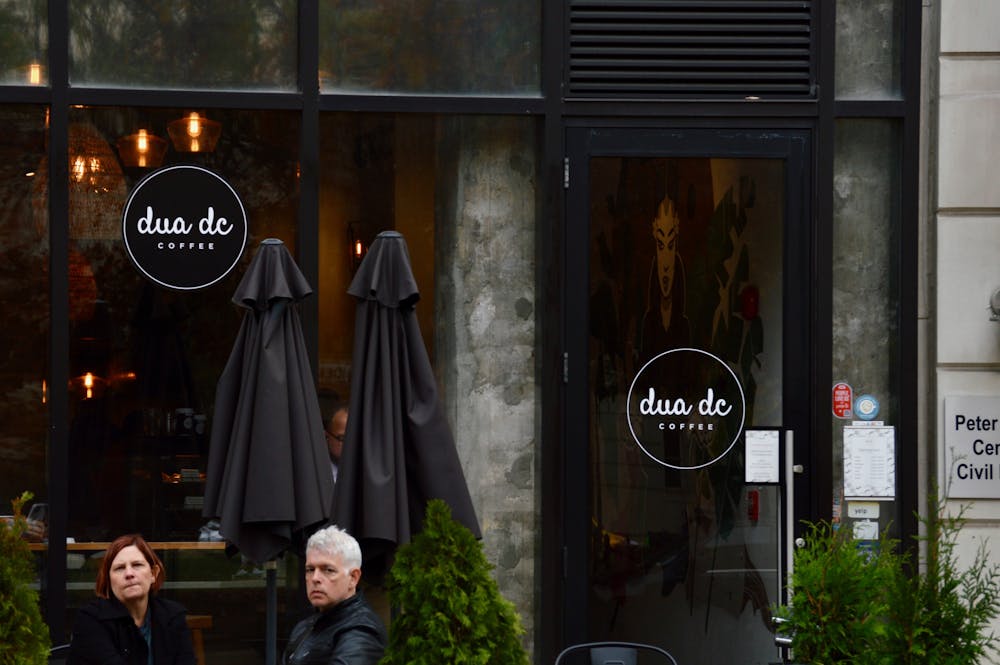With beautiful wall art, full bookshelves and plenty of comfortable seating, the atmosphere inside Dua DC cultivates a sense of community for all who enter. What makes this coffee shop unique from the rest stems from one characteristic: its ecologically sustainable coffee beans.
Dua DC is a women-owned Indonesian specialty coffee shop located just a five-minute walk from the White House.
Vivit Kavi, the owner, moved to the U.S. from Indonesia in 2005 with her husband and daughters. After a successful career in journalism, Kavi decided to use her expertise in connection and communication to bring part of home to D.C.
Kavi’s goal is to convey firsthand the rich variety Indonesia has to offer in every single cup of coffee brewed, showcasing the many different types of coffee it can produce.
Through hard work and partnerships in the U.S. and Indonesia, Kavi and her husband opened the doors of Dua DC in September 2019.
So what does it mean for a coffee shop to be ecologically sustainable? Essentially, it comes down to how the coffee beans are grown. Not only do the differences in altitude, temperature and soil affect how the brew tastes, but so does the way the land is cultivated.
Dua DC works directly with farmers in Indonesia to facilitate direct trade, making the coffee 100 percent single-origin Indonesian coffee.
“No middlemen exist,” Kavi said in an interview with The Eagle.
Kavi and her team visit the farms to speak to producers of the beans and interact with the community that is the backbone of their business.
One of the communities that they work closely with that helps put Dua DC directly into contact with farmers is Klassic Beans.
“This is a no-waste business, meaning they work with the land rather than against it,” Kavi said.
Klassic Beans and Dua DC promote working with the land and appreciating what it has to offer, not exploiting it. Klassic Beans and the farmers whom it assists have put this directly into practice, learning that everything needed to produce good coffee can be provided by nature.
Natural fertilizer comes from the animals living on the mountains, canopy trees protect the beans from damage or unwanted weather changes and the natural cycle of the environment ensures that all of this continues as production continues, maintaining the sustainability aspect of production.
Indonesian coffee beans, like most other beans, are grown in the mountainous soil. Planted side by side, the farmers believe the beans must be tied together to grow together, only separating after several months of steady growth have elapsed, Kavi said.
The characteristics of this soil along with weather changes, temperature and altitude factor into the taste of the beans and the coffee when it is brewed. A wide variety of flavor profiles exists thanks to the over 17,000 Indonesian islands.
In the past, Indonesia was mostly known for Sumatra coffee, a dark, dry, nutty and earthy taste that compares with coffee from Ethiopia.
However, many other different types have yet to be fully appreciated by the world. One of these flavors is from West Java, an area where soil was previously used for the cultivation of tea. When brewed, hints of black tea are tasted alongside rainy, dry and fruity flavors.
Dua DC seeks to shine a spotlight on the variety of flavors that exist in Indonesian coffee.
According to Kavi, the Dua DC team has received immense help from fellow coffee shops around D.C., demonstrating the idea that while competition is a given, it doesn’t take away from the sense of community and support for one another.
In a world where mass production and quantity are favored more than quality, Dua DC is a beacon for the exact opposite. Kavi said that to maintain consistency in something, you must always return to its origins and the natural process.
“You must have a give-and-take relationship with the land to have sustainable mass production,” Kavi said. “There is a way to have ‘mass production’ and remain sustainable as long as you’re willing to learn and be patient.”
When asked what the secret to this success was, Kavi said, “Whatever comes from the heart, touches the heart. Even on Zoom. We’ve been able to promote the idea that coffee is not just something you wake up for, but something you can enjoy and something that touches the hearts of all people.”
That very fact is evident. Throughout each phase of the production of this commodity through this business, the heart is the main element present, building bridges that connect customers and the business itself.
This article was edited by Sydney Hemmer, Marina Zaczkiewicz, and Abigail Turner. Copy editing done by Luna Jinks, Emma Brown and Ariana Kavoossi.





